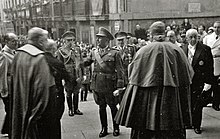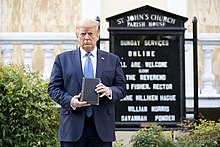
Most measures of religiosity, such as church attendance and affiliation, are positively correlated with the authoritarian personality cluster, which includes submission to authority, conventionality, and intolerance of out-groups. The correlation is especially strong between religious fundamentalism (defined as belief in an "inerrant set of religious teachings") and authoritarianism, both of which are characterized by low openness to experience, high rigidity, and low cognitive complexity. In particular, authoritarianism "is positively associated with a religion that is conventional, unquestioned, and unreflective".
Background

Hundreds of scientific articles have been published investigating the connections between religion and authoritarianism. There is a distinction between psychology, which treats authoritarianism as innate to the personality, and sociology, which considers authoritarianism a result of one's environment and posits that it may be influenced by factors such as religion.
A longitudinal study of Americans born in the 1920s found that this effect held for traditional church-centered religion but not for those that are seeking non-institutional spirituality. The latter mode of religion is "characterized by an openness to new experiences and by creativity and experimentation, characteristics that are antithetical to the conventionality that adheres in authoritarianism".
Specific cases
Throughout history, authoritarian leaders have adopted different policies towards religion, from state atheism to drawing support from religion or co-opting religious leaders and institutions. As part of civil society, organized religion serves as a mediator between the state and citizens, even under authoritarian governments. In Russia, the Russian Orthodox Church enjoys a state monopoly and state subsidies, as well as a blasphemy law that protects it from criticism. Authoritarian leaders may fear that religion will be the source of political opposition, instability, or outright rebellion. Indeed, some scholars and political leaders, such as Václav Havel, have praised the role of religion in undermining authoritarian governments. However, in other cases, religions have engaged in alliances with the state, and religious institutions are not necessarily pockets of dissent or incubators of democracy. Unregistered or minority religions have been suppressed by state authoritarian regimes, such as house churches in China. In 1999, Falun Gong practitioners launched widespread protests against the Chinese government, which led to the persecution of Falun Gong.
See also
- Catholicism in the Second Spanish Republic
- Christian right
- Hindutva
- Jewish right
- Russian Orthodox Church during the Russian revolution
- Wahhabism
- Salafism
References
- Casanova, Julian. Unearthing Franco's Legacy: Mass Graves and the Recovery of Historical Memory in Spain. p. 108.
- ^ Wills, Matthew (25 July 2017). "What Links Religion and Authoritarianism?". JSTOR Daily. Retrieved 27 August 2020.
- ^ Leak, Gary K.; Randall, Brandy A. (1995). "Clarification of the Link between Right-Wing Authoritarianism and Religiousness: The Role of Religious Maturity". Journal for the Scientific Study of Religion. 34 (2): 245–252. doi:10.2307/1386769. ISSN 0021-8294. JSTOR 1386769.
- ^ Wink, Paul; Dillon, Michele; Prettyman, Adrienne (2007). "Religiousness, Spiritual Seeking, and Authoritarianism: Findings from a Longitudinal Study". Journal for the Scientific Study of Religion. 46 (3): 321–335. doi:10.1111/j.1468-5906.2007.00361.x. ISSN 0021-8294. JSTOR 4621983.
- Olson, Laura R. (5 June 2020). "Trump's use of religion follows playbook of authoritarian-leaning leaders the world over". The Conversation. Retrieved 27 August 2020.
- Burge, Ryan P. (2018). "Authority, Authoritarianism, and Religion". Oxford Research Encyclopedia of Politics. doi:10.1093/acrefore/9780190228637.013.667. ISBN 978-0-19-022863-7.
- Koesel 2014, pp. 157, 159.
- ^ Koesel 2014, p. 177.
- Koesel 2014, p. 167.
- Koesel 2014, p. 159.
- Koesel 2014, p. 178.
- Koesel 2014, pp. 162–163.
- Koesel 2014, p. 174.
Bibliography
Koesel, Karrie J. (2014). Religion and Authoritarianism: Cooperation, Conflict, and the Consequences. Cambridge University Press. ISBN 978-1-107-03706-9.
Further reading
- Asp, Erik; Ramchandran, Kanchna; Tranel, Daniel (2012). "Authoritarianism, religious fundamentalism, and the human prefrontal cortex". Neuropsychology. 26 (4): 414–421. doi:10.1037/a0028526. PMC 3389201. PMID 22612576.
- Kuru, Ahmet T. (2019). Islam, Authoritarianism, and Underdevelopment: A Global and Historical Comparison. Cambridge University Press. ISBN 978-1-108-41909-3.
- Mavor, Kenneth I.; Louis, Winnifred R.; Laythe, Brian (2011). "Religion, Prejudice, and Authoritarianism: Is RWA a Boon or Bane to the Psychology of Religion?". Journal for the Scientific Study of Religion. 50 (1): 22–43. doi:10.1111/j.1468-5906.2010.01550.x. hdl:10023/4025.
- Moulian, Tomás (1979). "Religion and Authoritarianism". Social Compass. 26 (2–3): 331–344. doi:10.1177/003776867902600207. S2CID 144430581.
- Öztürk, Ahmet Erdi (2019). "An alternative reading of religion and authoritarianism: the new logic between religion and state in the AKP's New Turkey" (PDF). Southeast European and Black Sea Studies. 19 (1): 79–98. doi:10.1080/14683857.2019.1576370. S2CID 159047564.
- Paloutzian, Raymond F., ed. (2014) . Religious Orientation and Authoritarianism in Cross-cultural Perspective: A Special Issue of the International Journal for the Psychology of Religion. Psychology Press. ISBN 978-1-135-06529-4.
- Ritter, Kathleen; O'Neill, Craig (2014). Righteous Religion: Unmasking the Illusions of Fundamentalism and Authoritarian Catholicism. Routledge. ISBN 978-1-317-78626-9.
- Rowatt, Wade C.; Shen, Megan Johnson; LaBouff, Jordan P.; Gonzalez, Alfredo (19 December 2014). "Religious fundamentalism, right-wing authoritarianism, and prejudice: insights from meta-analyses, implicit social cognition, and social neuroscience". In Paloutzian, Raymond F.; Park, Crystal L. (eds.). Handbook of the Psychology of Religion and Spirituality, Second Edition. Guilford Publications. ISBN 978-1-4625-2053-4.
- Shaffer, Barbara A.; Hastings, Brad M. (2007). "Authoritarianism and religious identification: Response to threats on religious beliefs". Mental Health, Religion & Culture. 10 (2): 151–158. doi:10.1080/13694670500469949. S2CID 145365224.
- Van Pachterbeke, Matthieu; Freyer, Christopher; Saroglou, Vassilis (2011). "When authoritarianism meets religion: Sacrificing others in the name of abstract deontology: Authoritarianism, religious priming, and morality". European Journal of Social Psychology. 41 (7): 898–903. doi:10.1002/ejsp.834.
| Religion and ... | |
|---|---|
| (Some topic...) and religion | |
| Religion and (some topic) |
|
| Category:... and religion | |
| Category:Religion and ... | |